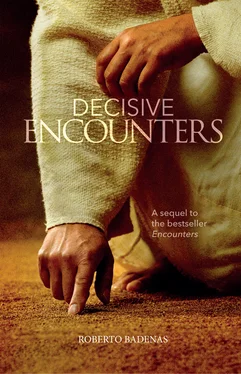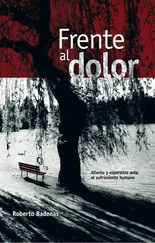If only we could purchase new netting, we would not have to spend so much time each day repairing these, so worn and torn. But times are bad and loans are difficult to repay. . . .
Simon remains still, with his gaze lost in the horizon. The gleaming of the sun over the water forces him to half close his dream-filled eyes. He would prefer not to be a mere fisherman all his life, tethered to an old boat and some fragile nets. Especially now that he got married and must support his wife and his mother-in-law.
To be a fisherman in Capernaum is to doom oneself to a monotonous succession of nights fishing and of days struggling with runaway sleep. It is to continue being embroiled in a hopeless struggle against misery. Nothing can satisfy the desires of a heart like his, thirsty for adventures and (why not?) for greatness.
Simon dreams, just like some of his fellow fishermen, of getting out of there and filling his inner emptiness with something great. But the only incentive of each workday is the uncertain catch with which to fill the baskets that his wife takes every morning to the market: some days more, others less, but always the same routine.
Except today, as the Teacher whom his brother Andrew follows has approached him and has asked to borrow His boat. He wanted to speak more thoroughly with a group of followers, who absorb His words and do not let him leave the jetty. The fame of the Galilean has not ceased to spread throughout the region. A mixed crowd wants to hear in person from the man about whom incredible things are said.
Because the words of the Teacher have such charm that they ensnare like nets.
Many still remain there, unable to say goodbye, while the children splash around amid laughter and games along the beach.
Leaning on the boat, barefoot in the water, this tireless man addresses, friendly and patient, the people who crowd around him yearning for words of life. And every so often, extending His hand to the surface of the water, He splashes the little ones who run around teasing him, without caring that the edge of His robe gets wet.
Returning to his task, Simon’s attention is drawn back to his tangled knots.
The fisherman continues waiting for a decisive event that will separate him from his ties and transform his monotonous existence into an exciting adventure. Something similar to what his brother believes to have found by following the new Teacher, that rabbi whose charm he can’t seem to escape.
Other than that, nothing seems to change in his harsh life.
At the port of Capernaum, in this small inland lake, merchant ships will never arrive from distant lands, through which Simon—who has never been able to leave the surrounding areas—would like to travel.
Perhaps the army . . . The Romans continue recruiting soldiers for expeditions of conquest in remote regions. Who knows if thanks to Rome he could achieve a bit of glory, and his name would remain immortalized forever in the history of the world. But now that he is married, that sounds too unreal, and those chimeras soon vanish from his mind, erased like footprints in the sand, washed away by the incessant breaking of the waves at his feet.
His chest, weathered by the water and the sun, slowly rises in a nostalgic sigh and slowly sinks back down, defeated and helpless, such torrent of contained energy, that he does not find—and fears never finding—a channel whereby it would be worthwhile overflowing.
Sitting on the sand, Simon continues repairing the nets, while the sun slides over his tanned skin and sketches elusive shapes upon the rhythmic movement of his robust arms. His thoughts wander without rhyme or reason, crashing against the invisible prison walls of his reality: doomed to be a fisherman his entire life, depending everyday on a basket of fish. His future is discerned at the same time so predictable and uncertain like the waves upon which he risks his life every night to take his measly sustenance from the sea.3
But that is how the few inhabitants of that fishing town live: He, his brother, his parents, Zebedee and his children, his friends . . . Simon sometimes speaks to them about the sharp sting of his discontent and of his mad desire for improvement. His friends support him, but the burden of work itself keeps them from supporting his dreams, and they allow themselves to be led by the routine without thinking about anything other than daily sustenance, which they must at any cost go out in search of over the waves of this modest lake.
That same night the boats were already fishing when the moon appeared, in an exiguous crescent that hardly made it possible to view the silhouettes of the ships on the waves. Simon had waited for the right moment to cast the net. Upon the agreed sign, in silence, he went about as usual: releasing the mooring and slowly lowering, without noise, the weights from the side of the ship concealed by the shadows.
From the other boats arrived the stifled murmur of the same maneuver, as every night. Then came the more sensitive work of quickly hoisting the netting before the fish could escape. The catch depended in large part on the speed and skill of such maneuver. Simon was a skillful fisherman who knew his trade better than did most.
When he sensed the sign of apparent tugs, he raised the net in one sudden stroke. But it was empty. He had to try again, once again lowering the netting over the side of the boat. Having failed, the fisherman repeated this fruitless operation several times throughout the night.
Simon was exhausted. The joints in his arms were hurting, and that backache was striking again. The bitter taste of defeat burned his parched lips.
The cool wind of daybreak made his perspiring body quiver, exposing tiredness and the anger of failure. In a last attempt, he pulled from the rigs. This time, they offered resistance. His boggling eyes opened even wider to see the silvery reflections of the desired catch emerging to the surface. But a muted scrape breached the net, and it turned up empty and torn, perhaps ripped apart by the mast of an old sunken ship.
The catch, until now fruitless, had now become impossible.
The exiguous moon had disappeared. Shrouded by darkness, Simon dropped himself onto the wet nets, and could not hold back his tears of anger. He swore to himself that, if he could, he would leave the fishing.
It was beginning to get light and at the glare of dawn, the fishermen returned, silent and glum, to the dock.
Along with his brother and his friends, he had stayed to repair the nets, attempting to delay the terrible moment of returning home with empty baskets, without fish and with no enthusiasm whatsoever.
And it was then when the Teacher arrived.
Strangers usually did not arrive too early to that beach, but Andrew and John recognized Him on the spot and ran to meet Him. Simon, inhibited, kept looking at that unique rabbi who, some days ago, had dared to kid him about his name . . .
Wow, you’re name is Simon Bar Jonah —He had told him. That of being an “obedient son of the dove” sounds good or that of “faithful follower of Jesus.” I hope that you are less of a pessimist that the old prophet . . . I see you as tough rather than meek. It would suit you better to be named Kepa,4 let’s say, Peter: What do you think about Beach Pebble?
The fisherman, disconcerted, did not know what to respond. Because in reality that is how he saw himself, like a beach pebble, worn by routine, unable to move from the shore on his own. His brother later explained to him that the new Teacher felt emboldened to change names because He was determined to transform lives.5
Intrigued by the charm of the mysterious rabbi, He could not resist when the rabbi asked to borrow his boat that same morning.
What does that man have that makes Him so irresistible, so convincing? His demeanor, His resolve, that air of knowing what He wants, an I don’t know what in the glance . . . That is how he would like to be. Yes, he wanted to be like Him, with that moving personality.
Читать дальше












